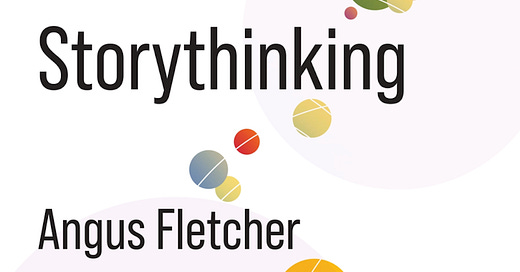Storythinking: The New Science of Narrative Intelligence, Angus Fletcher, 2023
Angus Fletcher is an English Professor at Ohio State University in Columbus. He has written extensively on narrative, rhetoric, ethics, and cognitive approaches to literature. Some of his other book titles are quite eye-catching; I'll probably take a closer look at a few of them. In the meantime, I was introduced to him via a short synopsis of this book that Heather Heying gave in episode #229 of the Darkhorse Podcast a couple of weeks ago. Her reaction to Fletcher's ideas made me curious, so I bought this short (<200 pages) book in Kindle and Audio formats. I did a quick "inspectional" listen while walking and decided I need to spend more time digesting and thinking about the book's thesis and the story Fletcher tells. It also occurred to me that my friend
might find it equally interesting, so I invited her to collaborate on a joint-reading project. Each week one of us will write a little essay on a chapter, and then the other will respond to both the chapter and the writer.Hey, this is Tracy. Glad to be here! My comments, interspersed, will be in italics, set off by horizontal rules.
Chapter 1, “Story” (Dan)
Fletcher begins with a brief description of what he was taught about stories and storytelling, as a student. He doesn't waste a lot of time describing this in extreme detail, but jumps quickly to a very interesting question and challenge:
What was the secret to truthful storytelling? Find that secret, and classrooms could be filled with enchanting textbooks, rescuing students from boredom and confusion. Find that secret, and propaganda could be dismantled, ending the reigns of brainwashers and demagogues. (2)
Fletcher decided that his teachers had made a mistake when they assumed story was "just for telling" knowledge or wisdom that had been achieved in some other way. "Story", he said, "was for thinking" (3).
Tracy’s comment. The author sometimes seems to conflate “his teachers” with long-standing philosophical or scientific (vs. humanistic?) tradition.
I could feel him bristle — and I bristled, too! — at the idea that story is only for telling, for communicating, not for thinking itself, and that the primary beneficiaries of story are those who require the thinking to be dumbed down!
Story’s lone job was to transmit logic’s inferences to folk who lacked the acumen to be logical themselves. (8)
An interesting element of Fletcher's story about story, for me, is that it's not just a human story. It's not about authors; or even language; or even people; or even recent animal species. He suggested instead that "the origins of life" were "creative action", which he said scientists call "reproducible new functions". These are acted on by selection to produce evolution. In this sense, the origins of story are about change over time and storythinking is about "contemplating why and what if" (4). In other words, thinking about causes and effects.
Why, then, isn't story more regularly acknowledged as a way of thinking? Fletcher said that for the past five thousand years or so, "philosophers had convinced my teachers--and just about everybody else--that intelligence sprang not from story but from logic." (5) The objection, he said, was that "story wasn't a reliable tool for thinking. It was too idiosyncratic, to arbitrary, too fact-independent." Actually, I think what he means is it was too contingent. The philosophers were looking for repeatable, scientific principles of action (something like this distinction remains near the core of my "beef" with sociology). Fletcher briefly traced logic's rise and then asserted that the same three syllogisms at the heart of Aristotle's Organon (And, Not, Or) "are the only rules of thought that AI--or any computer--ever uses" (8). I thought this was an interesting connection, and something to consider in light of the growing concern over what it means to make a human contribution in an age of Artificial Intelligences.
I think this distinction between logic and narrative is going to be the big topic of this book. Fletcher admitted that logic is thinking, but he claimed it wasn't the only kind. Tracing the development of logic to the visual cortex, Fletcher argued that the "narrative machine" developed in the motor cortex, which is at least as old. Also:
story and logic employ different epistemological methods. Logic’s method is equation, or more technically, correlational reasoning, which inhabits the eternal present tense of this equals that. Story’s method is experiment, or more technically, causal speculation, which requires the past/present/future of this causes that. Each method has its own operational range: logic’s is stable, high-data environments; story’s is volatile, low- (and even no-) data environments. (8)
I had a couple of thoughts about this. First, my mind returned to that difference I already mentioned between History, describing change over time and contingency, and Science, defining equations about immutable relationships. Then second, I was reminded of Bret Weinstein and Heather Heying's discussion, in A Hunter-Gatherer's Guide to the 21st Century, to the need to shift from "culture" to "creative thinking" when circumstances or the pace of change, or novelty shift from a steady state to a more chaotic mode. This has some resonance with Kuhn's distinction between periods of "normal science" and crises when paradigms are broken.
Tracy’s comment. Bringing in the deeper evolutionary time scale, including the association of logical thinking with the visual cortex and story thinking with the motor cortex, is a stimulating prospect.
I don’t know enough about evolutionary neurobiology to agree that this is where logic or story comes from, biologically speaking. But if logic is primarily about asserting “this = that” whereas story is primarily about causality: (does) “this → that” (?), one could easily hypothesize about the kind of thinking that would emerge from perceptual vs. motor activity. “I see that shape moving in the bushes. IS it a tiger!” Versus: “If I walk over that direction, will I find something to eat?” Motor activity involves a qualitatively different kind of thought and decision-making from processing visual or auditory or other sensory stimuli. I bet the whole field of embodied cognition contributes a lot here.
As you mention, Dan, it’s definitely interesting to consider the implications for artificial intelligence, and for History as a discipline, as a single contingent series of data points (really a series of anecdotes, since all historical events are unrepeatable experiments). An increasingly fast “pace of change, or novelty shift from a steady state to a more chaotic mode” of living — surely our present circumstance! — certainly would favor flexible and speculative forms of contingent thinking, wouldn’t it? Of what help would it be exactly to uncover Eternal Equations?
Fletcher went on to suggest that it seemed obvious that the brain could only communicate in narrative if it could think in narrative. (9) This interested me, because it implies that an effective way to TRICK the mind might be to embed falsehoods or propaganda in a compelling story. This could "short-circuit" the brain's analytical capacity by engaging what literature calls the "willing suspension of disbelief".
Fletcher also noted the tragic nature of logic-only education "that befuddles, shames, and demoralizes students by ruthlessly assessing human brains on tasks--memorization, critical thinking, quantitative reasoning--that are better performed by smartphones". Another reference to the important question of how to focus people on HUMAN tasks in an age of intelligent machines.
Tracy’s comment. Apart from the “structural” differences — and pros and cons — between logic thinking and story thinking, there are also psychological ones, and other dangers. Stories tap into emotions, and when the data is minimal, or contingent, aren’t humans easily swayed?
On the other hand, over-reliance on “just the facts, ma’am,” equations, data, statistics, and graphs excludes the numerically illiterate, the math phobes. It may also just plain de-humanize whatever the topic is at stake.
Fletcher continues by defining the three main elements of storythinking as prioritizing the exceptional, perspective shifting, and stoking narrative conflict. It struck me that the first element, which Fletcher elaborated as "resisting the temptation to abstract individuals into universal archetypes" (12), aligns perfectly with Tolkien's claim that "I cordially dislike allegory in all its manifestations." It also interested me that the OUTPUT of the logical process was a *synthesis* of the thesis and antithesis, while the output of narrative "plot" was "original action" (13).
Finally, Fletcher illustrated the ideas he had laid out, using Hamlet, and then concluded that science is "Hamlet's laboratory partner", operating by the same rules. This returned my mind to Kuhn. Understanding scientific progress as a journey of change over time would have to be narrative. But that isn't how we think about it; especially during eras of "normal science".
Tracy’s comment. I’m intrigued by the three main features of story thinking: prioritizing the exceptional, shifting perspective, and stoking narrative conflict. Hamlet as literary example was illustrative. I’m not so convinced by the over-brief references to Darwin, Curie, and Einstein. Re: “stoking narrative conflict,” the third element, that narrative conflict is different from conflicting ideas is really compelling:
[Narrative conflict, plot, is] different from a conflict between ideas, arguments, theories, and other logical stuff, because instead of generating dialectic syntheses and resolution, it creates original actions. And the only way to find out what those actions can do is to test them simultaneously, comparing their effects. (12)
Even if a battle is not in the actual world — where it could only play out once, with one outcome — “encouraging a [narrative] battle in your head… between two asymmetric physical causes, like when a novelist pits characters against one another, generating plot” has clear implications for how to deliberate about taking one course of action over another, or adopting one policy over another, or deciding whether to accept a proposed political alignment.
I’ll close with Fletcher’s stated ambition (!) for his book:
This book’s ambition is to do for storythinking what Aristotle’s Organon did for logic: provide a philosophical introduction to improving our brain’s inborn ability. (10)
and
By improving our storythinking, we can thus make our earthly lives hardier, healthier, and happier. Or to invest that humble project with a loftier tone: By improving the practice of narrative cognition, we can advance philosophy’s original purpose of gaining the good life. (11)
I had to chuckle at the author’s closing teasers. His aim is no less than to:
deepen your neural know-how of narrative (15)
and
Empower your brain to strategize in chaos, evolve in doubt, and thrive in life… offer(ing) methods for the mad. (16)
And on to chapter 2.






